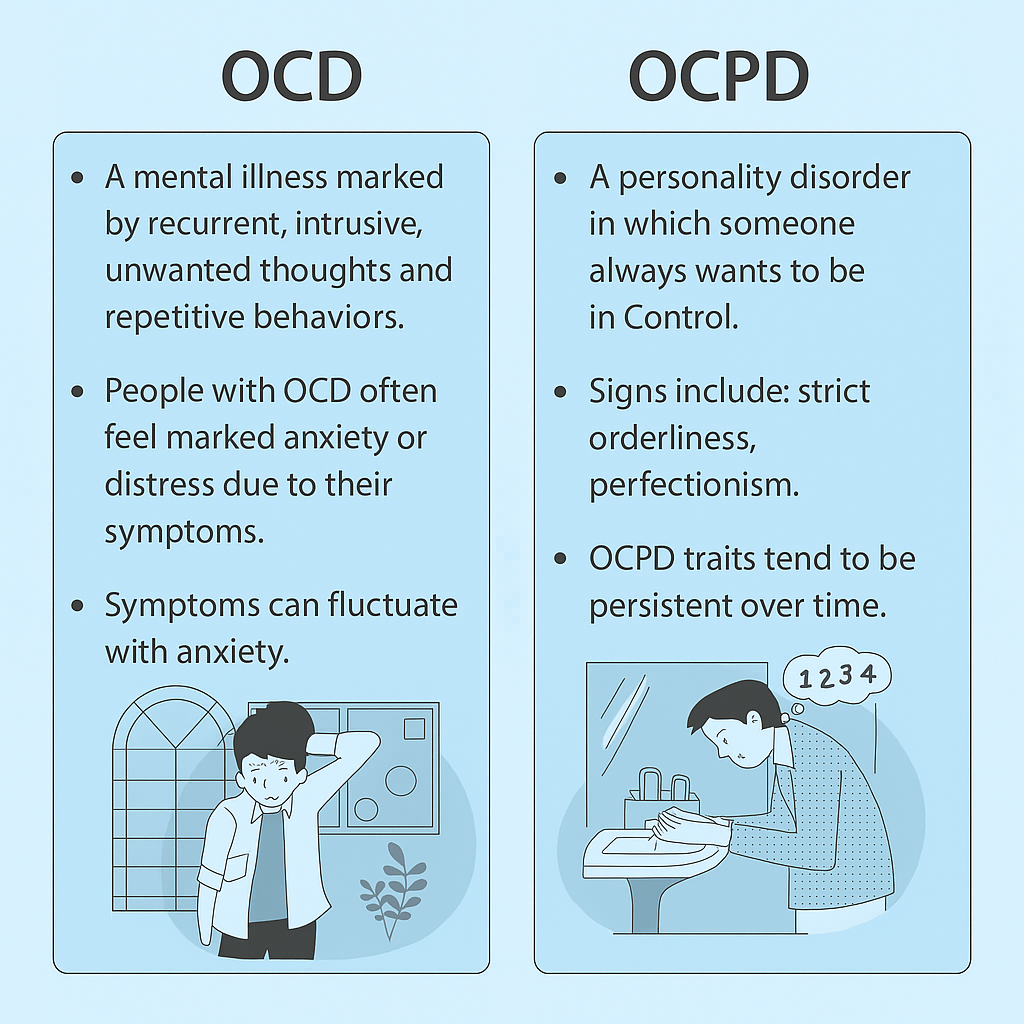🧠 OCD vs OCPD: Understanding the Key Differences
Obsessive-Compulsive Disorder (OCD) and Obsessive-Compulsive Personality Disorder (OCPD) are two mental health conditions that are often confused due to their similar names. However, they differ significantly in terms of symptoms, causes, and impact on daily life. Understanding these distinctions is crucial for proper diagnosis and treatment.
🔬 What is OCD?
OCD is a mental illness marked by recurring, intrusive, and unwanted thoughts (obsessions), which often lead to repetitive behaviors (compulsions). These rituals are performed in an effort to reduce anxiety, but the relief is usually temporary.
Common Features:
Intrusive Thoughts: Repeated, unwanted thoughts that cause distress (e.g., fear of germs or harm).
Compulsive Behaviors: Rituals like excessive hand washing, checking, or counting.
Emotional Distress: People with OCD often experience high levels of anxiety or shame due to their behaviors.
🧠 What is OCPD?
OCPD, on the other hand, is a personality disorder characterized by a chronic preoccupation with rules, orderliness, and control. Unlike OCD, these traits are ego-syntonic, meaning the person sees them as appropriate or even desirable.
Common Features:
Perfectionism: A rigid adherence to rules and standards, often to the detriment of flexibility and relationships.
Control Issues: A strong need to be in charge of situations, often leading to difficulty delegating.
Persistent Traits: Unlike OCD symptoms which fluctuate, OCPD behaviors are consistent over time.
⚖️ OCD vs OCPD: A Quick Comparison
| Feature | OCD | OCPD |
|---|---|---|
| Nature | Anxiety disorder | Personality disorder |
| Thoughts | Intrusive and distressing | Viewed as rational |
| Behavior | Repetitive rituals | Perfectionism and control |
| Emotional Distress | High distress and anxiety | Low insight; often unaware |
| Persistence | Symptoms fluctuate | Traits are long-term |
🧩 Diagnosis and Treatment
OCD:
Cognitive Behavioral Therapy (CBT): Especially Exposure and Response Prevention (ERP).
Medications: SSRIs are commonly prescribed.
Support Groups: Peer support plays a major role in recovery.
OCPD:
Talk Therapy: Focuses on flexibility and emotional expression.
Medication: May be used if anxiety or depression co-exists.
Long-Term Care: OCPD often requires ongoing psychotherapy.
🧠 Why the Confusion?
The overlap in terms like “obsessive” and “compulsive” can lead to misdiagnosis. However, while OCD causes significant emotional disruption and distress due to unwanted symptoms, OCPD behaviors are usually perceived as logical by the person affected—even when these behaviors harm relationships or productivity.
✅ Final Thoughts
OCD and OCPD are different conditions with unique challenges. Understanding these distinctions helps patients, families, and clinicians offer better support and targeted treatment. Early recognition is key to improving quality of life and reducing long-term distress.
Frequently Asked Questions (FAQs)
-
Aim for 4-6 focused hours, ensuring you incorporate breaks to avoid burnout.
-
Practice mindfulness techniques, take practice exams under realistic conditions, and maintain a balanced lifestyle.
-
Set short-term goals, seek support from mentors, and reward yourself for small achievements.
-
Regular exercise improves focus, reduces stress, and enhances overall mental clarity.
-
KOTC offers personalized learning tools, gamification features, and adaptive question banks to help students stay on track without burnout.


